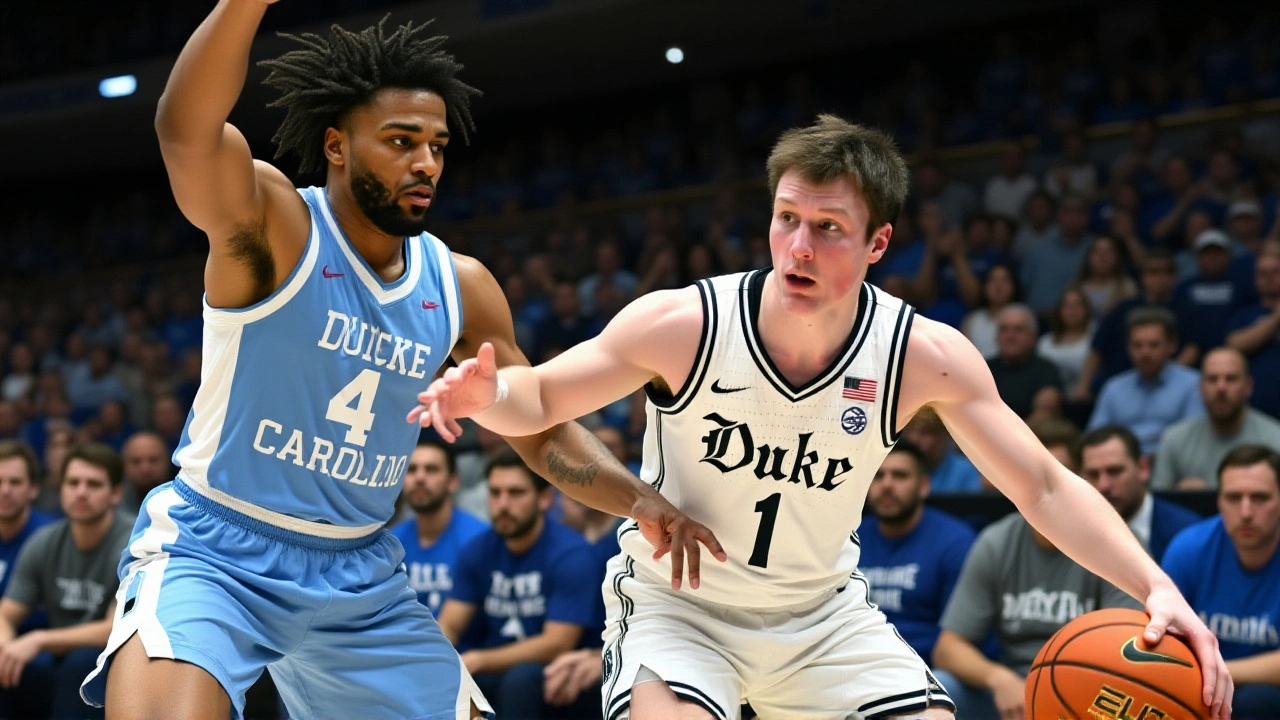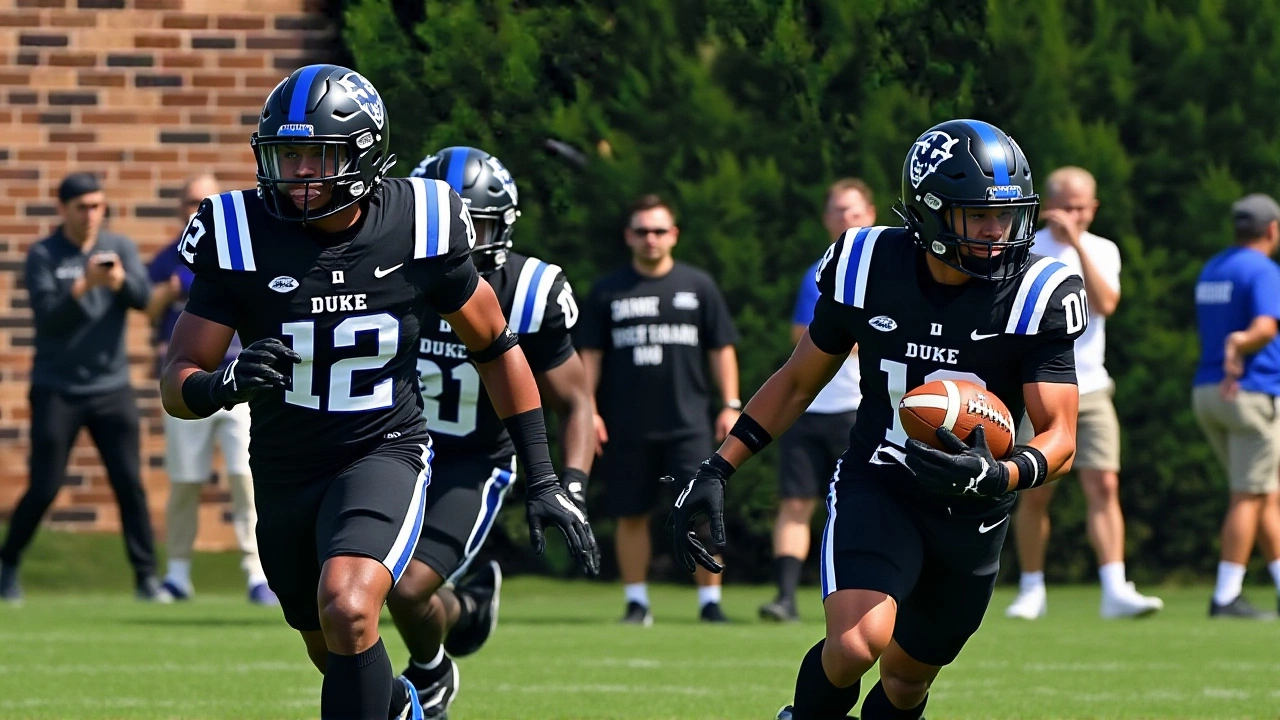
With 2:18 left and trailing by a point, Duke Blue Devils didn’t kick the field goal — they pulled off a trick play that changed everything. Anderson Castle, the junior running back, punched in a 1-yard touchdown to give Duke the lead, capping off a stunning 26-yard fake field goal that stunned North Carolina Tar Heels fans at Kenan Stadium in Chapel Hill. The final: 32-25. The result? Duke became bowl eligible for the first time since 2021, while North Carolina’s season ended in disappointment — and not just because they lost.
The Play That Broke the Game
It was fourth-and-1 at the UNC 27-yard line. The clock ticked under three minutes. Duke, down 25-24, lined up for a field goal. But instead of Todd Pelino taking the snap and kicking, he received a lateral from holder Kade Reynoldson — and took off like a sprinter. No one expected it. No one was ready. Pelino, a kicker by trade, rumbled 26 yards untouched to the UNC 1-yard line. The crowd fell silent. The defense scrambled. And then Castle did what he’d done all day: punch it in."That’s the kind of play you dream about as a kid," Castle said after the game. "Coach Diaz told us in the huddle, ‘If they’re playing the kick, we’re going to run.’ And they did. We just had to execute."
Castle’s Triple Threat
This wasn’t a one-play wonder. Castle finished with three 1-yard touchdowns — all in the red zone, all under pressure. He carried the ball 13 times for 49 yards, but his real value was in timing. He scored in the first quarter to tie it 7-7, again in the third to give Duke a 24-18 lead, and then the game-winner. He wasn’t the biggest back on the field — but he was the most relentless.Meanwhile, Darian Mensah, Duke’s redshirt senior quarterback, threw for 175 yards and a touchdown, added 27 more on the ground, and didn’t turn the ball over. His connection with Nate Sheppard on the two-point conversion after Castle’s final TD was textbook: a quick slant left, Sheppard caught it in stride, and the lead ballooned to seven.

UNC’s Self-Inflicted Wounds
North Carolina didn’t lose because they were outplayed — they lost because they couldn’t control themselves. Twelve penalties. 103 yards. Three unsportsmanlike-conduct flags in the final 10 minutes alone. One came after a late hit on Mensah. Another after a verbal tirade from a sideline player. The third? A taunt directed at Duke’s special teams after a punt."We gave them life," said Bill Belichick, North Carolina’s first-year head coach and former New England Patriots legend. "We had chances. We had the ball. We had momentum. But we kept digging our own grave with penalties and poor discipline. That’s on me. That’s on us. Not the refs. Not the calls. Us."
Even with those setbacks, UNC fought. Quarterback Gio Lopez threw for a touchdown and ran for another. Running back Davion Gause broke loose for a 12-yard score. Wideout Jordan Shipp caught eight passes for 83 yards, including a 20-yard TD that tied the game at 17-17 in the second quarter.
But when it mattered most — fourth-and-8 at their own 38 with 1:18 left — Lopez’s pass to Kobe Paysour fluttered incomplete. The game was over.
Why This Matters Beyond the Score
Duke’s win wasn’t just about making a bowl game. It was about breaking a pattern. Since 1990, Duke had won back-to-back games against UNC only twice. Now, they’ve done it a third time. And this wasn’t a fluke. They converted five of six fourth downs. They held UNC to 3-for-12 on third down. They outgained the Tar Heels in time of possession by nearly seven minutes.For Manny Diaz, in his first year at Duke, it’s a statement. After years of mediocrity, his aggressive, smart coaching — especially that fake field goal — signaled a new era. "We don’t play scared," Diaz said postgame. "We play to win. Even when the odds are against us."
For Belichick, it’s a sobering end to a historic but flawed debut. The man who won six Super Bowls in New England is now facing the reality of rebuilding a program with limited talent, recruiting challenges, and a culture that’s been broken for years. The 4-7 record isn’t just disappointing — it’s a warning.

What’s Next?
Duke (6-5, 5-2 ACC) will now wait for bowl selection on December 1, likely heading to either the Duke’s Mayo Bowl or the Independence Bowl. They’ll enter as a team that believes in its identity: physical, disciplined, and unafraid to take risks.UNC (4-7, 2-5 ACC) will begin a long offseason. Belichick has already hinted at staff changes and a renewed focus on discipline. But without bowl eligibility, the Tar Heels lost valuable practice reps, exposure, and recruiting momentum.
And for fans? The Victory Bell — the trophy awarded to the winner of this rivalry — now sits in Durham for the second straight year. A rare thing. A meaningful thing.
Frequently Asked Questions
How did Duke become bowl eligible with a 6-5 record?
The NCAA requires teams to win at least six games to qualify for a bowl game. Duke’s 6-5 record, including five wins in the ACC, made them eligible for the first time since 2021. With 10 bowl slots available for 6-6 teams and below, Duke’s strong conference performance and rising profile made them a prime candidate for selection, especially after defeating a rival in dramatic fashion.
Why is Bill Belichick coaching at UNC?
After retiring from the NFL in 2024, Belichick accepted the head coaching position at the University of North Carolina in January 2025, citing a desire to return to coaching at the college level. His hiring was historic — the first time the legendary Patriots coach had ever coached in college football. While his NFL success drew national attention, his inexperience with NCAA recruiting and player development has been a challenge in his first season.
What’s the significance of the fake field goal in college football?
Fake field goals are high-risk, high-reward plays rarely attempted in close games. Duke’s success — a 26-yard run by a kicker — is one of the longest and most consequential in ACC history. It’s the kind of play that shifts momentum and changes how opponents prepare. Only three such successful fake field goals have led to game-winning touchdowns in the final two minutes of a rivalry game since 2000.
How rare is it for Duke to beat UNC two years in a row?
Since 1990, Duke has won back-to-back games against UNC just twice before — once from 1993 to 1994, and again from 2012 to 2013. This marks the third time in 35 years. The rivalry has been dominated by UNC for decades, making Duke’s recent success a major turning point. The Blue Devils now lead the series 51-47-5 overall, but the last two wins have shifted the psychological balance.
What role did penalties play in UNC’s loss?
North Carolina’s 12 penalties for 103 yards — including three unsportsmanlike-conduct calls in the fourth quarter — directly cost them field position and momentum. One penalty wiped out a 45-yard punt return. Another gave Duke a first down on a critical fourth-and-12. The three unsportsmanlike flags in the final minutes turned potential stops into gift drives for Duke. Discipline, not talent, was the deciding factor.
How did Duke’s fourth-down efficiency impact the game?
Duke converted five of six fourth-down attempts — a rate rarely seen in high-stakes games. That included a 4th-and-3 at their own 42 in the third quarter, which led to Castle’s second touchdown. It showed their offensive confidence and coaching trust. UNC, by contrast, went 1-for-5 on fourth down, including a failed attempt on their final drive. That stat alone tells you which team believed they could win — and which one didn’t.
